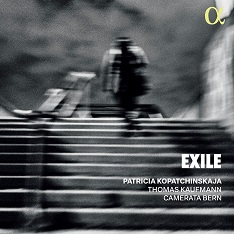Das war ja nicht anders zu erwarten: Ein abwechslungsreiches Programm, in dem PatKop auch singt und in dem sie Stücke vorträgt, die man kaum oder gar nicht kennt, und das alles in bester Laune und technischer und interpretatorischer höchster Qualität. Ihrer Masche bleibt sie also treu. Das Album bietet zudem noch als Leitfaden das Thema Exil an, das sich unter verschiedenen Aspekten bei den Komponisten und Werken findet.
Exil als zwangsweise Abwesenheit von der Heimat muss man hier auch weiter verstehen.
Das Quartett von Wyschnegradsky war seiner Zeit musikalisch voraus, da die Vierteltöne auf wenig Verständnis stießen, so dass er sich musikalisch im Exil befand. Schon im Titel nimmt das Werk von Ysaÿe das Exil auf und scheint damit eine Objektivierung zu zeigen. Schnittke, der erst spät die Sowjetunion verließ, musste im Hin und Her aus staatlicher Anerkennung und Verdammung leben. Sein Land Polen dauerhaft verlassen hatte Panufnik. In ein inneres Exil hatte Schubert sich zurückgezogen. Und wie steht es um den Kuckuck im moldawischen Volkslied, der im fremden Nest geboren wird und damit nie eine Heimat hatte?
Kopatchinskaja brennt wie immer für die von ihr zusammengestellte und präsentierte Musik. Dabei tritt ihr Spiel besonders im dem von Yehudi Menuhin beauftragten und für ihn komponierten Konzert von Andrzej Panufnik ins Zentrum, da das Orchester hier nur eine zurückgenommene Rolle hat. Ausgefeilt und immer stringent die musikalische Aussage vorantreibend führt sie durch das Programm.
Dabei nimmt sie zum wiederholten Male das von ihr bevorzugte Ensemble, die Camerata Bern, mit auf die Weg, die mit ebenso aufmerksamem wie um die eigenen Qualitäten bewussten Spiel den passenden Rahmen gibt.
Für die Cellosonate von Alfred Schnittke, die hier in der Bearbeitung für Cello, Streicher und Cembalo von Martin Merker aus dem Jahre 2020 erklingt, hat Thomas Kaufmann das Solo übernommen. Als Solocellist des Orchesters bot er sich für dieses Werk an. Auch er prägt die Musik mit seinem bestens ausgestalteten Spiel.
That was to be expected: A varied program in which PatKop also sings and in which she performs pieces that are hardly known or not known at all. And all of this is presented in high spirits and with the highest technical and interpretative quality. So she remains true to her style. The album also offers the theme of exile as a leitmotif, which can be found in various aspects of the composers and works.
Exile as a forced absence from one’s homeland must also be understood in a broader sense here. Wyschnegradsky’s quartet was musically ahead of its time, as the quarter tones met with little understanding, so that he found himself musically in exile. The title of Ysaye’s work already refers to exile and thus seems to show an objectification. Schnittke, who left the Soviet Union at a late stage, had to live in the back and forth between state recognition and condemnation. Panufnik had left Poland permanently. Schubert had withdrawn into an inner exile. And what about the cuckoo in the Moldavian folk song, which was born in a foreign nest and therefore never had a home?
As always, Kopatchinskaja is on fire for the music. Her playing takes center stage in the concerto by Andrzej Panufnik, which was commissioned by Yehudi Menuhin and composed for him, as the orchestra only has a subdued role here. She leads through the program in a sophisticated and always stringent manner, driving the musical message forward.
Once again, she takes her favorite ensemble, the Camerata Bern, along for the ride, providing the appropriate framework with playing that is as attentive as it is aware of its own qualities.
Thomas Kaufmann is the soloist in Alfred Schnittke’s Cello Sonata, which is performed here in the arrangement for cello, strings and harpsichord by Martin Merker from 2020. As the orchestra’s principal cellist, he was the obvious choice for this work. He also shapes the music with his excellently shaped playing.


















